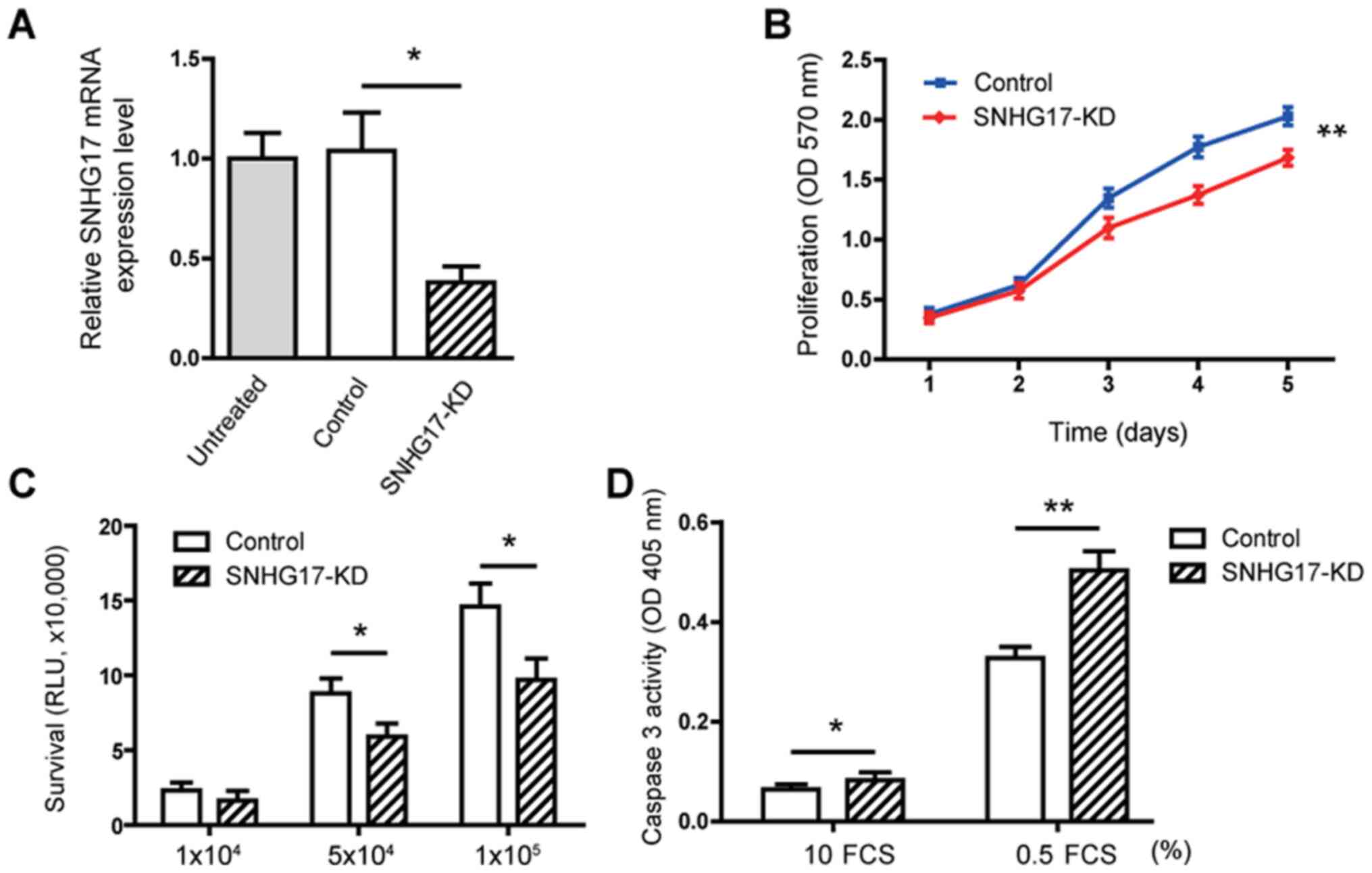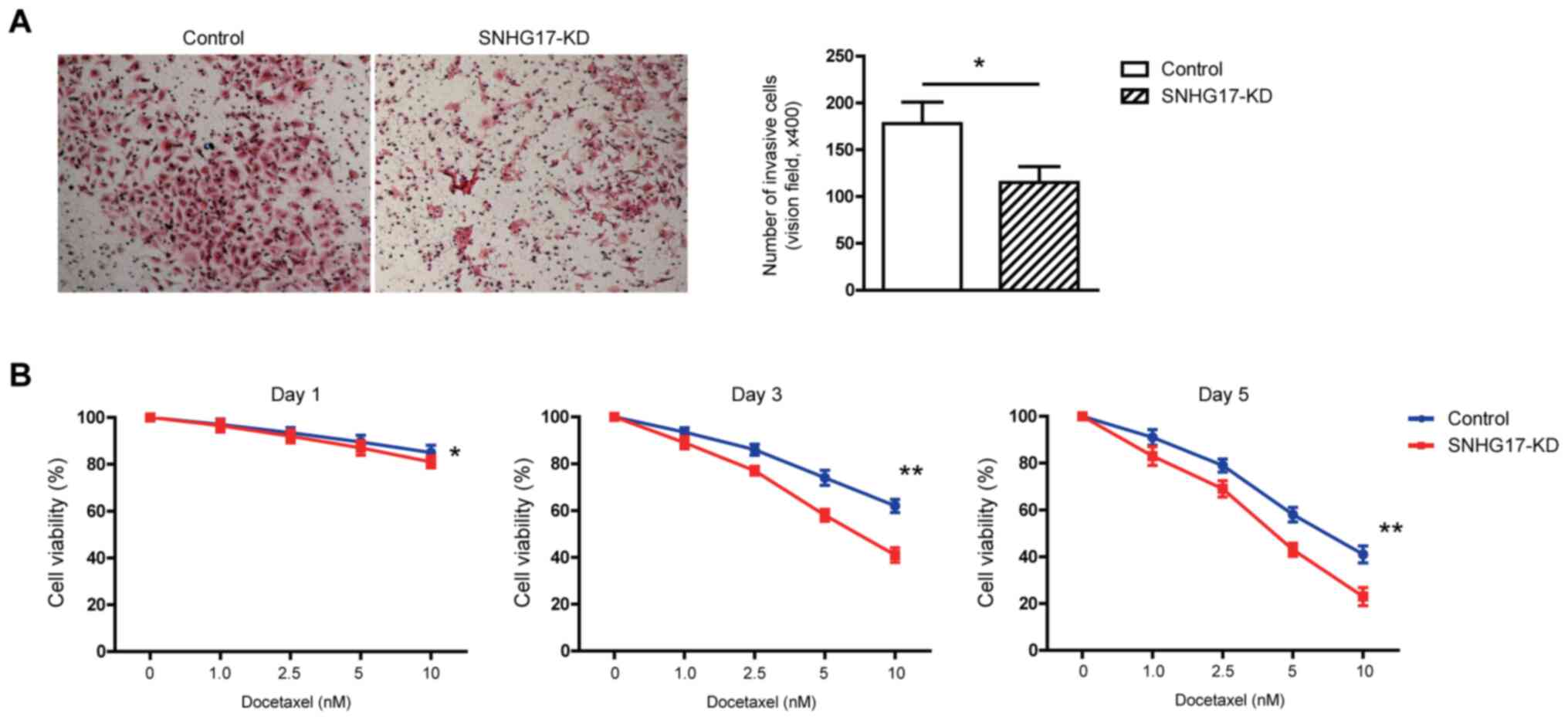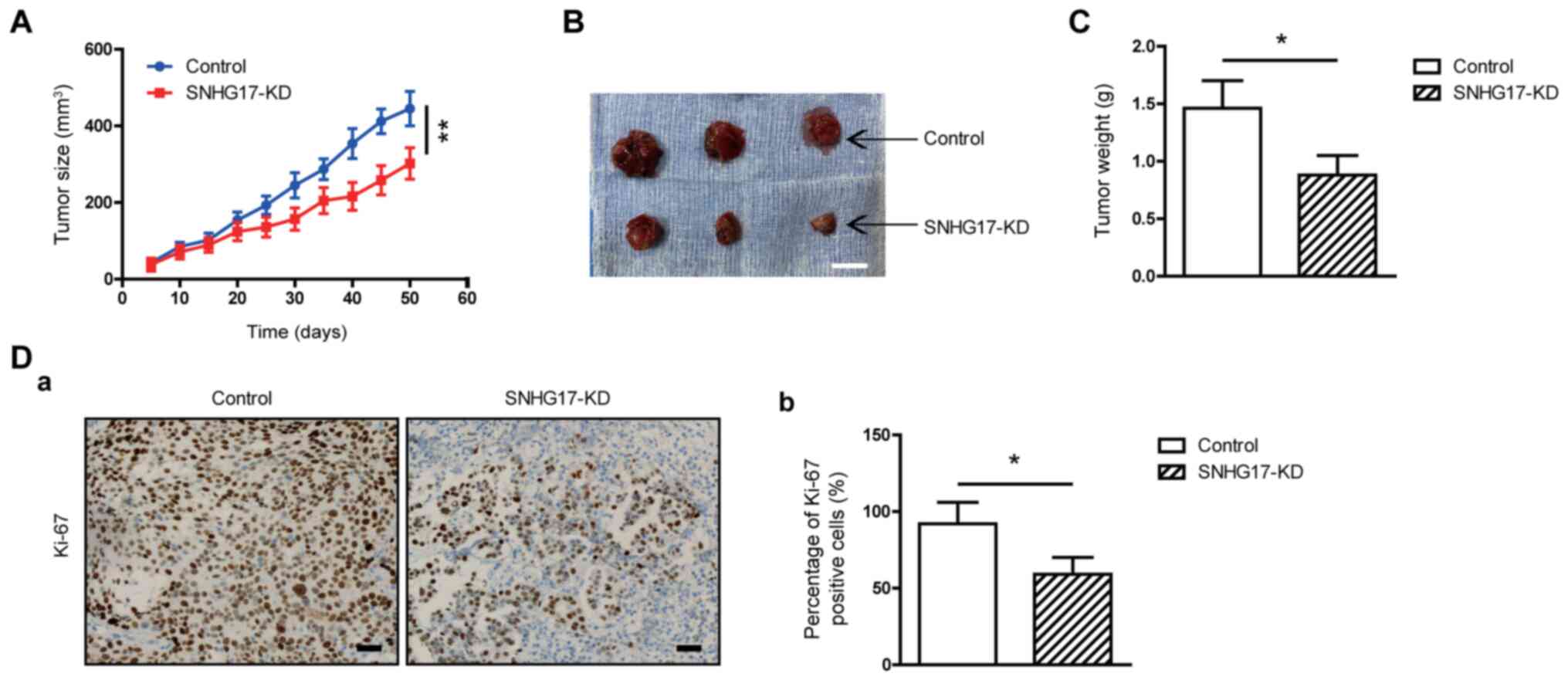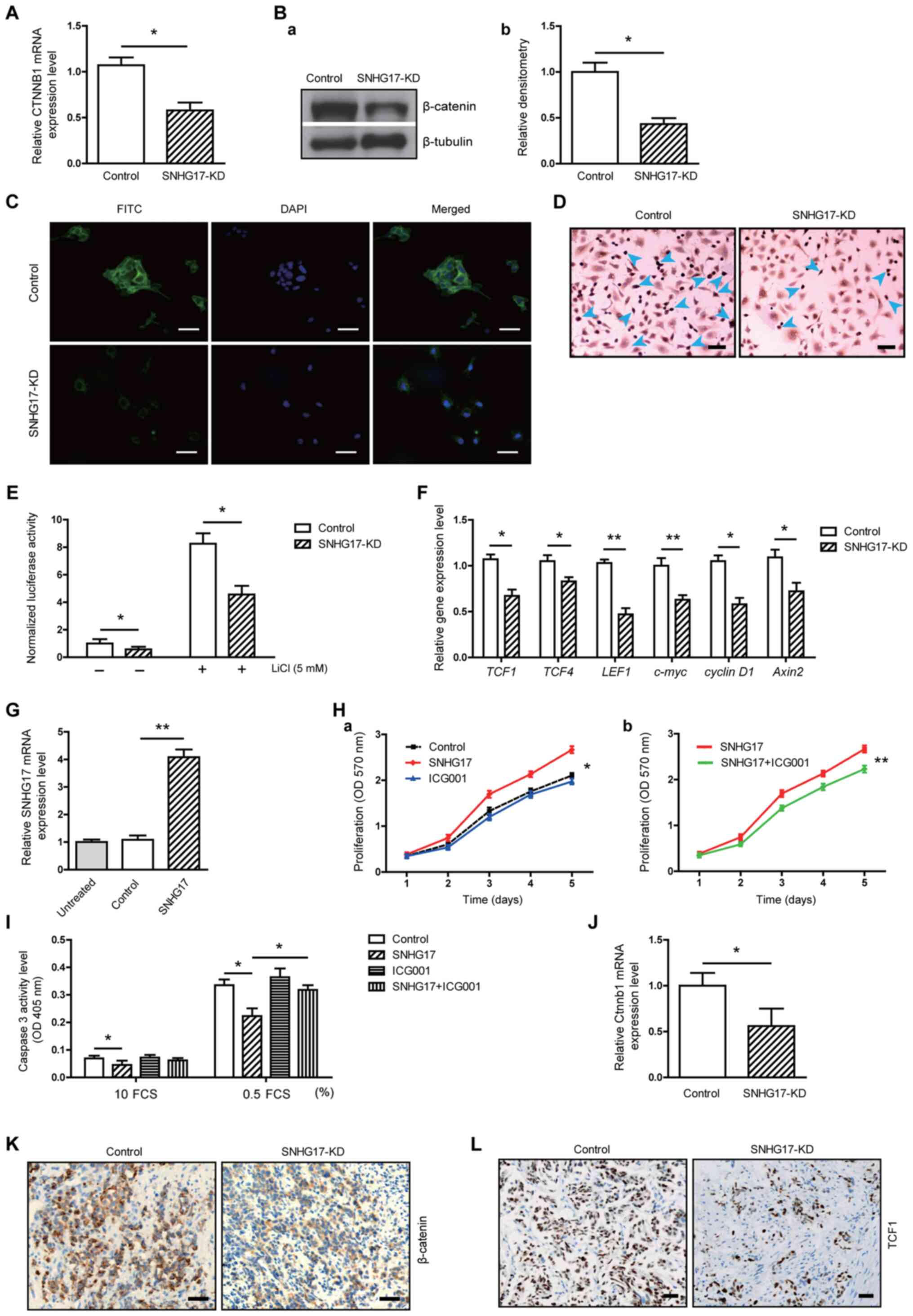|
1
|
Global Burden of Disease Cancer
Collaboration, ; Fitzmaurice C, Allen C, Barber RM, Barregard L,
Bhutta ZA, Brenner H, Dicker DJ, Chimed-Orchir O, Dandona R, et al:
Global, regional, and national cancer incidence, mortality, years
of life lost, years lived with disability, and disability-adjusted
life-years for 32 cancer groups, 1990 to 2015: A systematic
analysis for the global burden of disease study. JAMA Oncol.
3:524–548. 2017. View Article : Google Scholar : PubMed/NCBI
|
|
2
|
Chandrasekar T, Yang JC, Gao AC and Evans
CP: Mechanisms of resistance in castration-resistant prostate
cancer (CRPC). Transl Andro Urol. 4:365–380. 2015.PubMed/NCBI
|
|
3
|
Mansinho A, Macedo D, Fernandes I and
Costa L: Castration-Resistant prostate cancer: Mechanisms, targets
and treatment. Adv Exp Med Biol. 1096:117–133. 2018. View Article : Google Scholar : PubMed/NCBI
|
|
4
|
Aird J, Baird AM, Lim MCJ, McDermott R,
Finn SP and Gray SG: Carcinogenesis in prostate cancer: The role of
long non-coding RNAs. Noncoding RNA Res. 3:29–38. 2018. View Article : Google Scholar : PubMed/NCBI
|
|
5
|
Weiss M, Plass C and Gerhauser C: Role of
lncRNAs in prostate cancer development and progression. Biol Chem.
395:1275–1290. 2014. View Article : Google Scholar : PubMed/NCBI
|
|
6
|
Zhang T, Hu H, Yan G, Wu T, Liu S, Chen W,
Ning Y and Lu Z: Long non-coding RNA and breast cancer. Technol
Cancer Res Treat. 18:15330338198438892019. View Article : Google Scholar : PubMed/NCBI
|
|
7
|
Wu J, Cheng G, Zhang C, Zheng Y, Xu H,
Yang H and Hua L: Long noncoding RNA LINC01296 is associated with
poor prognosis in prostate cancer and promotes cancer-cell
proliferation and metastasis. Onco Targets Ther. 10:1843–1852.
2017. View Article : Google Scholar : PubMed/NCBI
|
|
8
|
Petrovics G, Zhang W, Makarem M, Street
JP, Connelly R, Sun L, Sesterhenn IA, Srikantan V, Moul JW and
Srivastava S: Elevated expression of PCGEM1, a prostate-specific
gene with cell growth-promoting function, is associated with
high-risk prostate cancer patients. Oncogene. 23:605–611. 2004.
View Article : Google Scholar : PubMed/NCBI
|
|
9
|
Wang L, Han S, Jin G, Zhou X, Li M, Ying
X, Wang L, Wu H and Zhu Q: Linc00963: A novel, long non-coding RNA
involved in the transition of prostate cancer from
androgen-dependence to androgen-independence. Int J Oncol.
44:2041–2049. 2014. View Article : Google Scholar : PubMed/NCBI
|
|
10
|
Ma Z, Gu S, Song M, Yan C, Hui B, Ji H,
Wang J, Zhang J, Wang K and Zhao Q: Long non-coding RNA SNHG17 is
an unfavourable prognostic factor and promotes cell proliferation
by epigenetically silencing P57 in colorectal cancer. Mol Biosyst.
13:2350–2361. 2017. View Article : Google Scholar : PubMed/NCBI
|
|
11
|
Xu T, Yan S, Jiang L, Yu S, Lei T, Yang D,
Lu B, Wei C, Zhang E and Wang Z: Gene amplification-driven long
noncoding RNA SNHG17 regulates cell proliferation and migration in
human non-small-cell lung cancer. Mol Ther Nucleic Acids.
17:405–413. 2019. View Article : Google Scholar : PubMed/NCBI
|
|
12
|
Zhang G, Xu Y, Wang S, Gong Z, Zou C,
Zhang H, Ma G, Zhang W and Jiang P: LncRNA SNHG17 promotes gastric
cancer progression by epigenetically silencing of p15 and p57. J
Cell Physiol. 234:5163–5174. 2019. View Article : Google Scholar : PubMed/NCBI
|
|
13
|
Willert K and Nusse R: Wnt proteins. Cold
Spring Harb Perspect Biol. 4:a0078642012. View Article : Google Scholar : PubMed/NCBI
|
|
14
|
Zhan T, Rindtorff N and Boutros M: Wnt
signaling in cancer. Oncogene. 36:1461–1473. 2017. View Article : Google Scholar : PubMed/NCBI
|
|
15
|
Murillo-Garzon V and Kypta R: WNT
signalling in prostate cancer. Nat Rev Urol. 14:683–696. 2017.
View Article : Google Scholar : PubMed/NCBI
|
|
16
|
Kumar A, Zloza A, Moon RT, Watts J,
Tenorio AR and Al-Harthi L: Active beta-catenin signaling is an
inhibitory pathway for human immunodeficiency virus replication in
peripheral blood mononuclear cells. J Virol. 82:2813–2820. 2008.
View Article : Google Scholar : PubMed/NCBI
|
|
17
|
Gedaly R, Galuppo R, Daily MF, Shah M,
Maynard E, Chen C, Zhang X, Esser KA, Cohen DA, Evers BM, et al:
Targeting the Wnt/beta-catenin signaling pathway in liver cancer
stem cells and hepatocellular carcinoma cell lines with FH535. PLoS
One. 9:e992722014. View Article : Google Scholar : PubMed/NCBI
|
|
18
|
Livak KJ and Schmittgen TD: Analysis of
relative gene expression data using real-time quantitative PCR and
the 2(-Delta Delta C(T)) method. Methods. 25:402–408. 2001.
View Article : Google Scholar : PubMed/NCBI
|
|
19
|
Krakhmal NV, Zavyalova MV, Denisov EV,
Vtorushin SV and Perelmuter VM: Cancer invasion: Patterns and
mechanisms. Acta Naturae. 7:17–28. 2015. View Article : Google Scholar : PubMed/NCBI
|
|
20
|
Petrylak DP, Tangen CM, Hussain MH, Lara
PN Jr, Jones JA, Taplin ME, Burch PA, Berry D, Moinpour C, Kohli M,
et al: Docetaxel and estramustine compared with mitoxantrone and
prednisone for advanced refractory prostate cancer. N Engl J Med.
351:1513–1520. 2004. View Article : Google Scholar : PubMed/NCBI
|
|
21
|
Lohiya V, Aragon-Ching JB and Sonpavde G:
Role of chemotherapy and mechanisms of resistance to chemotherapy
in metastatic Castration-Resistant prostate cancer. Clin Med
Insights Oncol. 10 (Suppl 1):S57–S66. 2016.PubMed/NCBI
|
|
22
|
Ramnarine VR, Kobelev M, Gibb EA, Nouri M,
Lin D, Wang Y, Buttyan R, Davicioni E, Zoubeidi A and Collins CC:
The evolution of long noncoding RNA acceptance in prostate cancer
initiation, progression, and its clinical utility in disease
management. Euro Urol. 76:546–559. 2019. View Article : Google Scholar : PubMed/NCBI
|
|
23
|
Du Y, Wei N, Hong J and Pan W: Long
non-coding RNASNHG17 promotes the progression of breast cancer by
sponging miR-124-3p. Cancer Cell Int. 20:402020. View Article : Google Scholar : PubMed/NCBI
|
|
24
|
Eggener SE, Badani K, Barocas DA,
Barrisford GW, Cheng JS, Chin AI, Corcoran A, Epstein JI, George
AK, Gupta GN, et al: Gleason 6 prostate cancer: Translating biology
into population health. J Urol. 194:626–634. 2015. View Article : Google Scholar : PubMed/NCBI
|
|
25
|
Takeuchi H, Ohori M and Tachibana M:
Clinical significance of the prostate-specific antigen doubling
time prior to and following radical prostatectomy to predict the
outcome of prostate cancer. Mol Clin Oncol. 6:249–254. 2017.
View Article : Google Scholar : PubMed/NCBI
|
|
26
|
Shulman MJ, Karam JA and Benaim EA:
Prostate-specific antigen doubling time predicts response to
deferred antiandrogen therapy in men with androgen-independent
prostate cancer. Urology. 63:732–736. 2004. View Article : Google Scholar : PubMed/NCBI
|
|
27
|
Luqmani YA: Mechanisms of drug resistance
in cancer chemotherapy. Med Princ Pract. 14 (Suppl 1):S35–S48.
2005. View Article : Google Scholar : PubMed/NCBI
|
|
28
|
Li JF, Li WH, Xue LL and Zhang Y: Long
non-coding RNA PICART1 inhibits cell proliferation by regulating
the PI3K/AKT and MAPK/ERK signaling pathways in gastric cancer. Eur
Rev Med Pharmacol Sci. 23:588–597. 2019.PubMed/NCBI
|
|
29
|
Rani N, Nowakowski TJ, Zhou H, Godshalk
SE, Lisi V, Kriegstein AR and Kosik KS: A primate lncRNA mediates
notch signaling during neuronal development by sequestering miRNA.
Neuron. 90:1174–1188. 2016. View Article : Google Scholar : PubMed/NCBI
|
|
30
|
Hu XY, Hou PF, Li TT, Quan HY, Li ML, Lin
T, Liu JJ, Bai J and Zheng JN: The roles of Wnt/β-catenin signaling
pathway related lncRNAs in cancer. Int J Biol Sci. 14:2003–2011.
2018. View Article : Google Scholar : PubMed/NCBI
|
|
31
|
Yu J, Han Z, Sun Z, Wang Y, Zheng M and
Song C: LncRNA SLCO4A1-AS1 facilitates growth and metastasis of
colorectal cancer through β-catenin-dependent Wnt pathway. J Exp
Clin Cancer Res. 37:2222018. View Article : Google Scholar : PubMed/NCBI
|
|
32
|
Tian Z, Yang G, Jiang P, Zhang L, Wang J
and Sun S: Long non-coding RNA Sox4 promotes proliferation and
migration by activating Wnt/β-catenin signaling pathway in
osteosarcoma. Pharmazie. 72:537–542. 2017.PubMed/NCBI
|
|
33
|
Guo JC, Yang YJ, Zheng JF, Zhang JQ, Guo
M, Yang X, Jiang XL, Xiang L, Li Y, Ping H and Zhuo L: Silencing of
long noncoding RNA HOXA11-AS inhibits the Wnt signaling pathway via
the upregulation of HOXA11 and thereby inhibits the proliferation,
invasion, and self-renewal of hepatocellular carcinoma stem cells.
Exp Mol Med. 51:1–20. 2019. View Article : Google Scholar
|
|
34
|
Kim U, Kim CY, Lee JM, Ryu B, Kim J, Shin
C and Park JH: Pimozide inhibits the human prostate cancer cells
through the generation of reactive oxygen species. Front Pharmacol.
10:15172020. View Article : Google Scholar : PubMed/NCBI
|
|
35
|
Takeuchi H, Taoka R, Mmeje CO, Jinesh GG,
Safe S and Kamat AM: CDODA-Me decreases specificity protein
transcription factors and induces apoptosis in bladder cancer cells
through induction of reactive oxygen species. Urol Oncol.
34:337.e11–8. 2016. View Article : Google Scholar : PubMed/NCBI
|



















